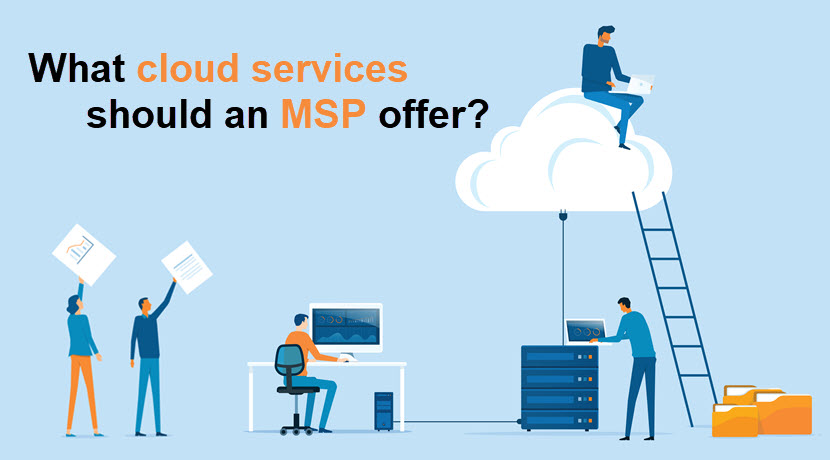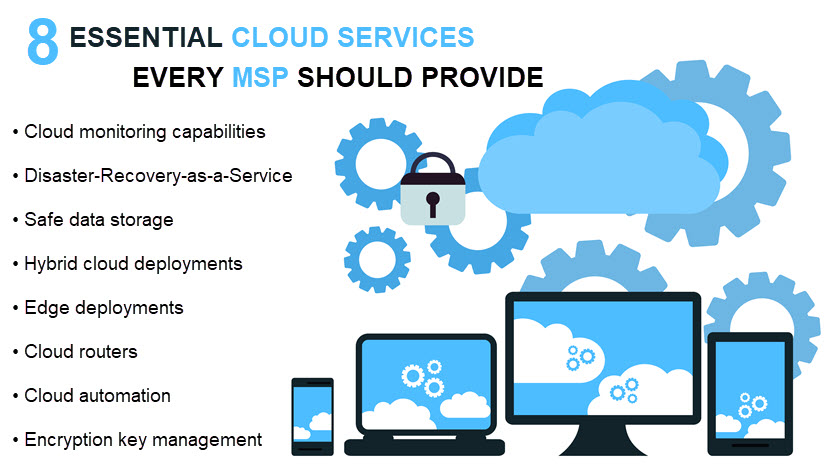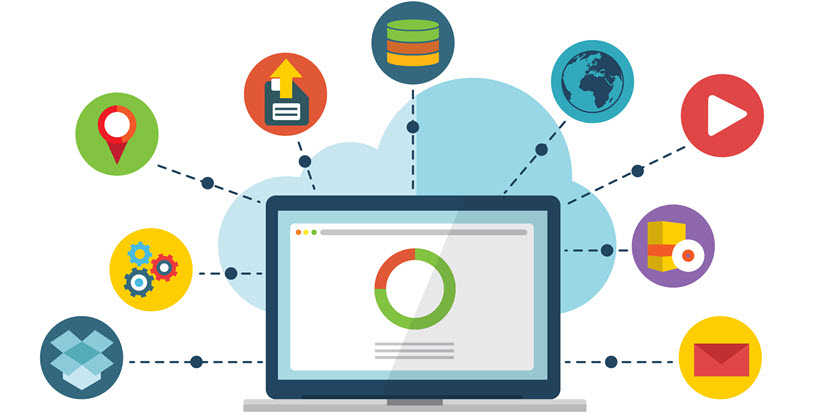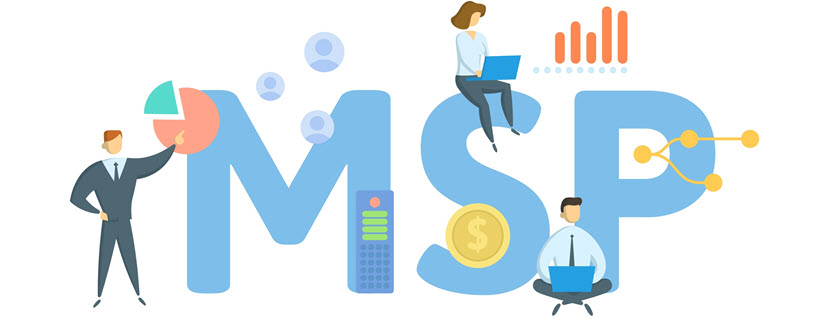8 Cloud Services MSPs Should Offer
While the demand for cloud services is at an all-time high, so are customer expectations. Creating a well-rounded cloud offering has never been more challenging as clients expect a varied, one-stop-shop service portfolio.
But precisely what do you need to offer to stand out from other managed service providers (MSPs)?
This article offers an in-depth look at the 8 essential cloud services MSP companies must provide to their clients. If you are a budding provider, this post will give you a clear understanding of what it takes to create a competitive cloud computing offering.

Before you read on, we suggest you first go through our article on managed IT services to get a firm grasp of MSPs, outsourced IT, and the effects of managed services.
Which Cloud Services MSP Companies Should Offer
Around 85% of IT leaders and decision-makers agree that outsourcing a cloud service from an MSP can:
- Help the IT department better protect company assets.
- Free up internal teams to focus on critical corporate tasks.
- Help ensure a successful cloud migration.
- Improve the morale of the in-house IT team.
- Boost the employee retention rate.
The demand for the cloud is undoubtedly there, but thriving in today's market is not easy. Below is a list of all cloud services an MSP company needs to provide to avoid losing clients to competitors.

1. Cloud Monitoring
Every MSP should provide cloud monitoring services so that the end-user can proactively evaluate the:
- The health of the cloud-based infrastructure.
- Various availability and performance metrics.
- Security of each cloud environment.
Every cloud-based system has many moving parts, so users need different types of monitoring to keep things running smoothly. From remote monitoring for regional zones to agent-based tracking, you need to provide capabilities for observing:
- Website performance: Measuring metrics such as traffic and resource usage reveals how activity impacts performance and loading times.
- Cloud storage: This monitoring capability measures cloud storage operations and makes volume layouts observable.
- Databases: The ability to track database requests, queries, data integrity, and user activity. This type of monitoring is vital as more than half of performance bottlenecks start in a database.
- Virtual machines: Virtualization monitoring tracks user activity, performance states, and capacity.
- Virtual networks: Real-time oversight of firewalls, switches, routers, and software-based load balancers.
- App performance management (APM): APM enables a user to monitor cloud-based apps in a single pane of glass, all the way to the code level.
- End-user experience monitoring (EUM): EUM helps a client measure metrics like crashes, page-load details, and rate-of-network requests.
Our article on cloud monitoring tools presents the 30 best solutions currently available on the market.
2. Disaster-Recovery-as-a-Service (DraaS)
Disaster-Recovery-as-a-service enables a user to set up a secondary failover site in case of business disruptions such as:
- A natural catastrophe (hurricane, flood, wildfire, earthquake, etc.).
- Power outage.
- Equipment failure.
- Cyberattacks.
DRaaS is a vital offering for clients who lack the necessary budget or expertise to run an effective disaster recovery (DR) site. In case of an incident, the user starts the disaster recovery plan and restores operations even if the primary facility suffers a total shutdown.
You can offer DRaaS either through a contract or a pay-as-you-go model (with payment based on storage, bandwidth, RAM, or compute consumption). Most MSPs provide three DRaaS models:
- Managed DRaaS: You take full responsibility for cloud disaster recovery and data backups.
- Assisted DRaaS: You split the duties of backups and disaster recovery with the client. For example, the customer can handle the failover of custom apps while you ensure the availability of IT infrastructure.
- Self-service DRaaS: The customer is solely responsible for planning, testing, and managing the entire DR strategy. Self-service DRaaS is always the cheapest form of DRaaS an MSP can offer.
PhoenixNAP's industry-leading Disaster-Recovery-as-a-Service solution enables a business to back up both data and IT infrastructure without the costs of setting up a secondary data center.
3. Safe Data Storage
Every MSP must provide clients with a secure way to store apps, data, and workloads in the cloud. You must maintain the so-called CIA triad of data safety:
- Confidentiality (protect data from unauthorized access, both from apps and people).
- Integrity (prevent unauthorized changes).
- Availability (ensure data is fully available and that the right people can access files when they need them).
These tenets must apply regardless of the cloud deployment model (public, private, hybrid, community, or multi-cloud) or as-a-service model (FaaS, IaaS, PaaS, or SaaS). Ideally, you should be able to guarantee cloud computing security with the following measures:
- Micro-segmentation.
- Advanced vulnerability scanning.
- Managed Detection and Response (MDR).
- End-point protection.
- Backup and disaster recovery (BDR).
- Data encryption (at rest, in transit, and in use).
- Strict access controls and zero-trust policies.
Your selling point is obvious: most companies cannot afford these measures on their own. Thanks to the top-tier security you provide, a cloud consumer can reliably prevent regulatory non-compliance (CCPA, GDPR, PCI, HIPAA, etc.), data breaches, and data leaks.
PhoenixNAP's Data Security Cloud (DSC) is a top-tier cloud platform that keeps data safe with strict segmentation, cutting-edge threat intelligence, and advanced physical security.

4. Hybrid Cloud
SMBs and enterprises continue to gravitate towards hybrid cloud due to the unique benefits of this model. The hybrid cloud architecture enables a company to unify cloud resources with on-prem systems to create a single, cost-optimal IT environment.
The core benefits of a hybrid cloud include:
- Choosing the optimal (and most cost-effective) environment for each workload.
- Combining best-of-breed cloud services from multiple vendors and data centers.
- Automating and orchestrating workloads between on-prem and cloud systems.
As an MSP, your task is to ensure the client does not run into common hybrid cloud challenges, such as:
- Security risks involved with moving data between multiple platforms.
- Possible non-compliance with legal regulations (especially data privacy laws).
- Compatibility concerns of integrating multiple systems.
- Lack of visibility across all environments.
- Issues with data portability and mobility.
The line between multi and hybrid clouds is sometimes blurry as both models rely on multiple infrastructures. Learn the difference between the two in our multi vs hybrid cloud article.
5. Edge Computing
Developments in IoT and 5G mean more and more clients will be interested in edge computing. Edge computing involves moving data processing from the cloud to local locations, such as a user computer, an IoT device, or an edge server.
Placing compute, storage, and analytics capabilities in an edge device close to the data source brings a line of benefits, such as:
- Reduced latency which leads to faster response times as you minimize the amount of long-distance communication between a client and server.
- Tighter network security due to local data processing.
- Lower costs as an edge server retains the bulk of raw data and lowers the amount of necessary bandwidth.
- Less strain on the central server.
Edge computing is among essential cloud services MSP companies must offer. Your customers can use edge computing in various ways—some typical use cases are:
- Smart security monitoring.
- Self-driving cars.
- Streaming services with more efficient caching.
- Medical monitoring devices.
- Interactive live video conferencing.
Edge computing addresses three inherent problems with the centralized data center model: bandwidth costs, latency issues, and data congestion. Expect the interest in edge computing to go nowhere but up in the coming years (as predicted in our cloud computing trends for 2022 article), so ensure your MSP offering enables a user to deploy at the edge.
You should also make an effort to solve as many usual edge computing challenges as possible to stand out from competitors.
PhoenixNAP's edge computing servers enable you to take processing to the network's edge and ensure smooth service delivery to wherever your users reside.
6. Cloud Routers
Cloud routers are another essential cloud service MSP companies must provide to their clients. Overcoming the challenges of a multi-cloud strategy continues to be an issue as moving data between different vendors remains slow, risky, and complex.
A cloud router is a managed virtual routing service that enables a client to establish low-latency connections between two or more networks or providers. A cloud router is ideal for connecting cloud workloads located at different CSPs as they ensure the connection is:
- Fast (since you can deploy a virtual router close to the actual cloud onramp).
- Safe (cloud-to-cloud direct connectivity enables advanced cybersecurity measures and practices).
- Flexible (cloud networking leads to highly scalable deployments and provisioning).
PhoenixNAP's Megaport Cloud Routers enable you to build a flawless foundation for any multi-cloud strategy you wish to deploy.

7. Cloud Automation
Deriving the cost and agility benefits of the cloud requires high levels of automation. As an MSP, you must help clients by automating repetitive tasks such as:
- Sizing, provisioning, and configuring virtual machines (VMs).
- Creating a VM cluster.
- Managing performance and load balancing.
- Monitoring availability metrics.
- Creating storage logical unit numbers (LUNs).
- Invoking a virtual network.
Manually performing these tasks is time-consuming and fraught with errors, which leads to high amounts of debugging and potential security risks. With cloud automation, the user eliminates repetition, inefficiency, and mistakes inherent to any manual process.
Common examples of automated cloud tasks include:
- Resource allocation: Autoscaling adjusts the use of compute, memory, or networking resources to match the current demand. This feature is essential to any pay-as-you-go cloud cost model you wish to offer.
- Configurations: A user can define infrastructure configurations via a template and IaC instead of manual settings.
- Development and deployment: Continuous software development and DevOps rely on automation throughout the CI/CD pipeline, from code scans and version control to testing and deployment.
- Tagging: Automatic tagging of an asset based on specific criteria, context, and operation conditions.
- Security: Automated security controls keep a cloud environment safe by restricting access to an app or data, threat scanning, and searching for anomalies.
- Logging: Cloud tools and functions can automatically log all activity involving a cloud service.
PhoenixNAP's Bare Metal Cloud takes automation to a new level by enabling you to deploy and manage a physical server with cloud-like simplicity. You can configure a new dedicated server with several clicks and spin it up in under 60 seconds.
8. Encryption Management
Since cybercrime is on the rise, more and more companies are turning to encryption to protect their most valuable asset: data. As an MSP, you must provide clients with data encryption and key management services in the cloud.
A single company can use hundreds if not thousands of different encryption keys. You should offer a customer the ability to use the cloud to perform key management and enable them to store, back up, and organize keys safely.
To stand out from other MSPs, you should:
- Centralize encryption key management (even if the client has a multi or hybrid cloud).
- Deploy key management best practices to provide consistent and reliable control over every key.
- Provide a reporting tool and audit support.
- Ensure the central key repository is bulletproof in terms of security.
- Offer on-demand extra services, such as key pair generation, escrow access, and key recovery.
- Provide confidential computing (the practice of encrypting in-use data).
Our Encryption Management Platform (EMP) centralizes key management across all IT environments and enables you to manage all keys from a single pane of glass.
Cloud Services MSP Companies Must Provide: If You Do Not Offer These Services, Other MSPs Will
Adding cloud services to your portfolio is a no-brainer, but creating a well-rounded offering is easier said than done. Competition is fierce, and user expectations are sky-high. Nevertheless, investing time and money into broadening your cloud services is a wise business move that will lead to more leads, opportunities, and revenue.